|

UJF Executive Vice President Michael Rassler gave closing
comments during UJF's 2006 annual meeting, celebrating 70 years since the
organization was formed by Jacob
Weinberger. Its first executive director was Albert
Hutler.
By Donald H. Harrison
LA JOLLA, Calif.— A heartening global pattern of
philanthropy, starting in the United States and extending to Israel, thence on
a round trip to Ethiopia, and finally back to the United States was described
by a succession of speakers Tuesday, June 27, at the United Jewish
Federation's Annual Meeting for 2006.
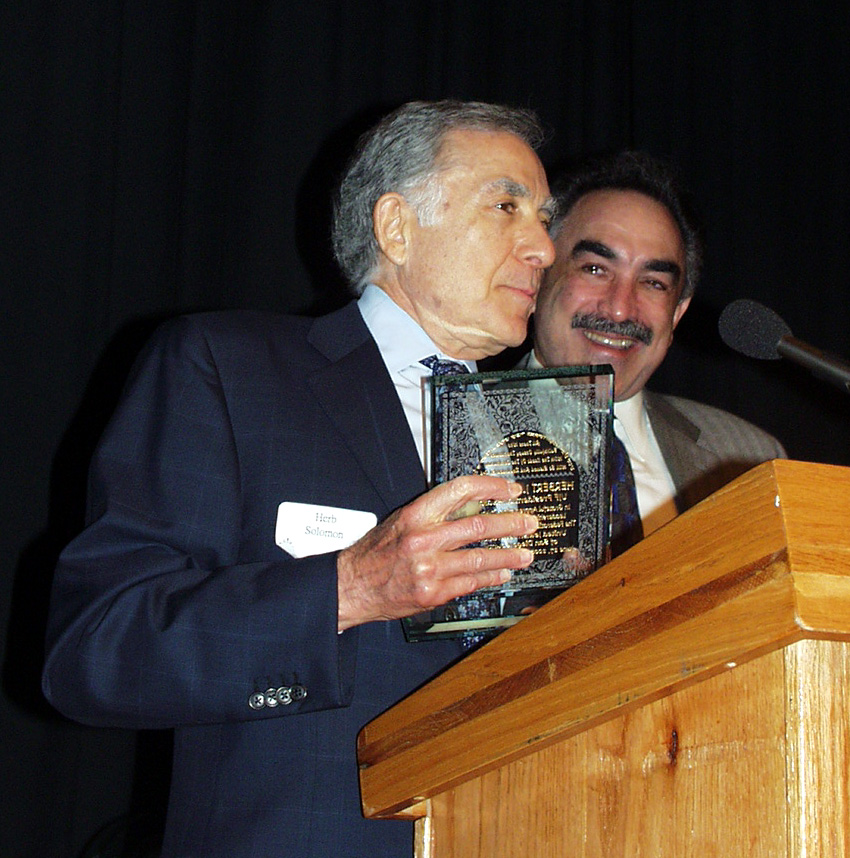 The
meeting at the Lawrence Family Jewish Community Center also saw Dr.
Steve Solomon succeeded as UJF president by Ken Polin, and seven San
Diegans given special recognition: Juli Bear, Brian Tauber and Kevin Wechter
as recipients of the Pauline & Stanley Foster Young Leadership Awards, and
Claire Ellman, Gary
Jacobs, Tammy Moch and Herb
Solomon as recipients of Steve Solomon's presidential awards. The
meeting at the Lawrence Family Jewish Community Center also saw Dr.
Steve Solomon succeeded as UJF president by Ken Polin, and seven San
Diegans given special recognition: Juli Bear, Brian Tauber and Kevin Wechter
as recipients of the Pauline & Stanley Foster Young Leadership Awards, and
Claire Ellman, Gary
Jacobs, Tammy Moch and Herb
Solomon as recipients of Steve Solomon's presidential awards.
The award to Herb Solomon, who served as UJF president in 1967, was
particularly poignant for his son, Steve. The 2004-2006 UJF president
recalled how as a child he watched his father lead an emergency campaign in
behalf of Israel in the tense month leading up to the Six Day War of
1967. Watching his father preside over that meeting nearly 40 years
Herb Solomon, left, clasps presidential
award from son, Steve,
outgoing UJF president, who beams with pleasure next to him
ago implanted within him the notion of giving back to the community,
Steve Solomon said.
Gary Kornfeld, chair of the UJF fundraising campaign, told the meeting that in
addition to $7.4 million in "unrestricted gifts" made to the
Federation this year—some of which will be allocated to help Jews
overseas—San Diegans contributed $660,000 toward a three-year goal of $1.5
million for Operation Promise.
Part of a three-year national fundraising goal of $160 million, Operation
Promise money will be used to support the Falas Mura in Ethiopia—descendants
of Jews who converted under pressure to Christianity—as well as for a
relocation program enabling this group of people to settle in Israel.
Additionally, the money will be used to help all Ethiopians, along with
immigrants from other countries, such as the former Soviet Union, to build
productive lives in Israel.
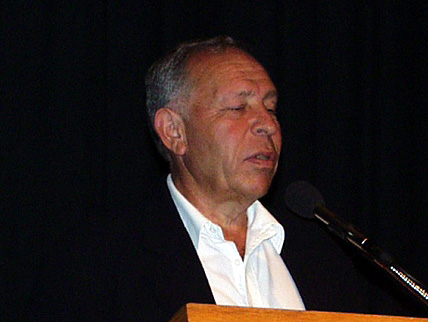 Micha
Feldman, who organized Operation Solomon which brought thousands of Jews from
Ethiopia to Israel in 1991, told of traveling to a Jewish village in Gondar
province five years before then and being amazed when children addressed him
in Hebrew. The next day, Shabbat, he watched as the small community took
from a wooden box its only Torah—which had been sent by a congregation in
New York—-and remembered how surprised he was when the rabbi of the small
synagogue told him to read the Torah. Micha
Feldman, who organized Operation Solomon which brought thousands of Jews from
Ethiopia to Israel in 1991, told of traveling to a Jewish village in Gondar
province five years before then and being amazed when children addressed him
in Hebrew. The next day, Shabbat, he watched as the small community took
from a wooden box its only Torah—which had been sent by a congregation in
New York—-and remembered how surprised he was when the rabbi of the small
synagogue told him to read the Torah.
When Feldman protested that he hadn't prepared, the rabbi would
hear no excuses. "No argument , you are from Jerusalem; you read
the Torah!" he commanded. When the Torah was unrolled, Feldman recognized
the portion as Bo. "Even now thinking of it, I get goose bumps,"
he told the UJF meeting. "Why? Because the parsha Bo
speaks about the last plagues in Exodus, and imagine, I a man from Jerusalem,
am standing in this small synagogue, in this small village in the midst of the
heart of Africa, surrounded by Black Jews, and I am reading about Exodus.
Standing there, I felt like the deputy messiah at least— and people came to
greet me, in order to touch me."
At that time, Ethiopian Jews could not simply decide to immigrate to Israel. They
had to slip out of the country, often taking up residence in sweltering
refugee camps in neighboring Sudan, where of 20,000 refuges, "4,000 are
buried in the sands," Feldman said.
Among the first Ethiopian Jews to get to Israel were students who came
ahead of their parents. "In the first months, there was euphoria, the
children for the first time going to school really were motivated to study,"
Feldman said. "Imagine coming from a refugee camp, even getting a hot
meal, a warm bed—a warm welcome is important. But after a few months, the
whole thing changed, and those children who wanted to study stopped studying
and we were very worried about that and they told us why when we asked them. They
said 'we can't focus on our studies because we are thinking of our parents'
and I gave those children my promise not knowing how I would keep it, that I
would get their parents to Israel.
In 1990, Feldman was appointed as the Israeli consul attached to the Jewish
Agency's field office in Ethiopia. He helped make the arrangements for
approximately 8,500 Ethiopian Jews to leave, including parents of those
children, passport by passport. However, he related, in May
1991 the Ethiopian capital of Addis Ababa "was under siege and we got a
chance with your help—American Jewry paid $35 million to the Ethiopian
government in order to let us do what was called afterwards Operation Solomon
.
"We took out of besieged Addis Ababa in one weekend, while the country
was at war, 14,210 Ethiopian Jews. We didn't go by the book...in a
(Boeing) 707 we took out 200 seats and we got in children with small
tushies—570. But the world record we broke when we put in a (Boeing)
747 instead of 400 odd people without taking the seats, counting every
soul, we got in 1,086. We got out 1,087 — we could hear the pilot say
'Mazal tov, I have a new-born passenger."
Operation Solomon was not the end of the mass evacuation. There were another
4,000 Ethiopian Jews in Qura, and currrently there are 11,000 Falas Mura
crammed in Addis Ababa waiting for their passage to Israel.
"I have not been to your home, but I assume that your bathroom is bigger
than the room where you find in Addis Ababa 6 to 8 people living,"
Feldman said. Operation Promise money is being collected because "the
people have to be fed; the children have to get schooling; there are a
lot of malnourished children; a lot of people need support. ... The most
important thing is to get them as soon as possible to Israel. I hope
that by Pesach 2008 we can conclude this heroic chapter in Jewish history and
bring the rest of the Ethiopian Jews to Israel. And then we have to keep
another promise, to really help them to get integrated into Israeli
society......"
Feldman said after Operation Solomon, people asked him continuously how he
felt about being the leader of the rescue effort for the Ethiopian Jews.
He said at first he was too fatigued to have an emotional reaction.
However a few weeks later, he was in Munich to talk to German Jews about the
needs of the Ethiopian Jews.
Before his speech he visited the concentration camp at Dachau, and there
"it struck us. ... We understood the significance of that operation, not
to the rescued but to us the rescuers. We understood the essence of the
existence of the State of Israel. We had understood that if Israel was founded
just a few years before it was founded, there wouldn't have been a Dachau or
an Auschwitz. We understood that Israel is not a normal country like
Canada is the country of the Canadians or Italy is the country of the
Italians. Israel is not the country of the Israelis; Israel is the
country of the Jews, and we were privileged to be in Ethiopia at that
time.
"And standing in front of the crematorium in Dachau, I said to myself,
'Instead of people thanking me, I should thank God and the people who have
sent me to Ethiopia, because everyone can read this story, some people can
even write it. I got my chance to be part of history-making....'
To the audience, he added pointedly, "Operation Promise gives you
the chance to be part of history-making..."
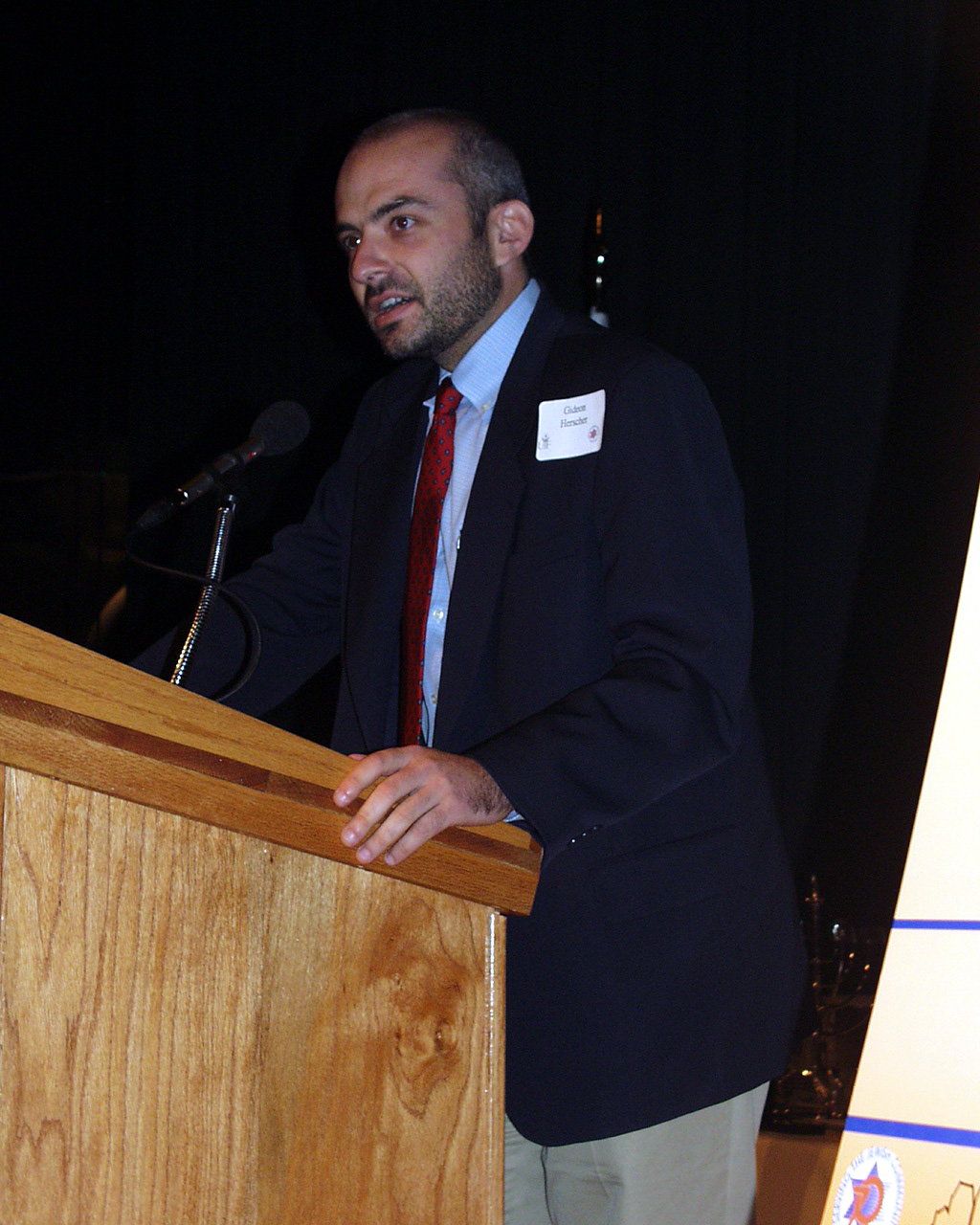 Gideon
Herscher, a specialist on Ethiopian Jewry for the American Jewish Joint
Distribution Committee, asked members of the UJF audience to think of
themselves going on another flight—not on a record-breaking flight for
having the most passengers, but on a normal flight leaving Addis Ababa at 2
a.m. and arriving at Ben Gurion Airport at 6 a.m. Gideon
Herscher, a specialist on Ethiopian Jewry for the American Jewish Joint
Distribution Committee, asked members of the UJF audience to think of
themselves going on another flight—not on a record-breaking flight for
having the most passengers, but on a normal flight leaving Addis Ababa at 2
a.m. and arriving at Ben Gurion Airport at 6 a.m.
"And the flight attendants come by before take off, and very politely ...
hand you a plastic bag. In the plastic bag, there are some headphones.
You know what to do , you tear open the bag, you are aware enough to know that
the pads are supposed to go around the ear portions of the phones, and you
look to your left and there is a woman born in a village 3 1/2 hours outside
of Addis Ababa , living in transit, displaced for the past three years outside
Addis Ababa, and she looks at you with the widest eyes, and has no idea what
she is supposed to do with this plastic package she has been given."
The woman is given instructions on how to fix the earphones and put them over
her ears. "...You fall asleep and you wake up three hours
later," Herscher said, "and on your left still is the same woman and
she is grinning with the biggest smile you have ever seen, and she has the
headphones right over her ears, she even got the foam around the plastic. And
the headphones are not connected to anything. But she had made the very
logical assumption that for one to fly on this thing called an 'airplane' one
must cover their ears...
"What's the point? The point is we haven't even landed in Israel
yet and already we see the disconnects and already we are looking at the gaps
that are forming in the very early stages.... This is what concerns me, and
this is what should concern all of us in this room, what happens the day
after?"
Herscher said "the challenges that Ethiopian Jews face in Israel are many
and I am going to throw out a few.... Seventy five percent are illiterate in
their mother tongue of Amharic, meaning they cannot read or write in their own
language. Forty-five percent of Ethiopian Israeli adults cannot hold a
basic conversation in Hebrew.... Two-third of Ethiopian Israeli households do
not have a breadwinner. You put these stats together, and you have a
recipe for disaster, one that could bring about the creation of a permanent
African underclass in our country, in Israel, and that concerns
me."
He said the situation is being felt even by the youngest members of the
Ethiopian Israeli community. When he arrived in Israel nine years ago,
after making aliyah from Los Angeles, "47 percent of
Ethiopian Israeli kindergarteners were held back at least one year from moving
into first grade.... Here are some of the reasons. Number one reason,
cultural codes. If I were an Ethiopian in Ethiopia and you were all my
elders I would not be addressing you today, making eye contact specifically,
but I would be addressing you with my eyes somewhat down. This is my way
of paying respect. In your eyes, I'm ill; why am I not addressing you, looking
out..... So these youngsters were not looking at their kindergarten
teachers."
A second reason, he said, was lack of access to day care. As in the United
States, Herscher said, "it is not subsidized, it is completely
privatized. This means that Ethiopian Israeli parents who are unemployed, or
even if they are employed, do not have equal access to actually enroll their
children in day care.
"Thirdly, in a kindergarten class of 30 plus kids, being an Ethiopian
Israeli trying to acquire the language is extremely difficult. You raise your
hand, you are not always heard. Culturally you might be shy... and you have
some serious issues. Operation Promise is completely aware of
these challenges and completely equipped to meet them."
He said one of the responses to this problem has the acronym PACT—Parents
And Children Together. "It is an early childhood initiative that
will address one-by-one each of the challenges I just mentioned. It
provides subsidies so parents can enroll their children in day care.... Take
the 30-kid class, and break it down into groups of five children and provide
them with literacy enrichment. Bring the parents into the
kindergarten. Hire Ethiopian Israeli liaisons. There's an
idea—bicultural, bilingual—that can reach out to the parents, communicate
with the kindergarten teachers and dispel all the myths and
misunderstandings..."
As a result of the PACT program, he said, instead of 47 percent of the
Ethiopian children being held back, today only 2 percent are being kept in
kindergarten for more than one year.
"Level the playing field while you can," urged Herscher. "My
concern is that I will be invited back to the San Diego Jewish community in
five years time and we will not have acted. And I will not be talking
about early childhood education. My concern is that I will be talking
about the prison system, drug abuse, prostitution, ghettos..."
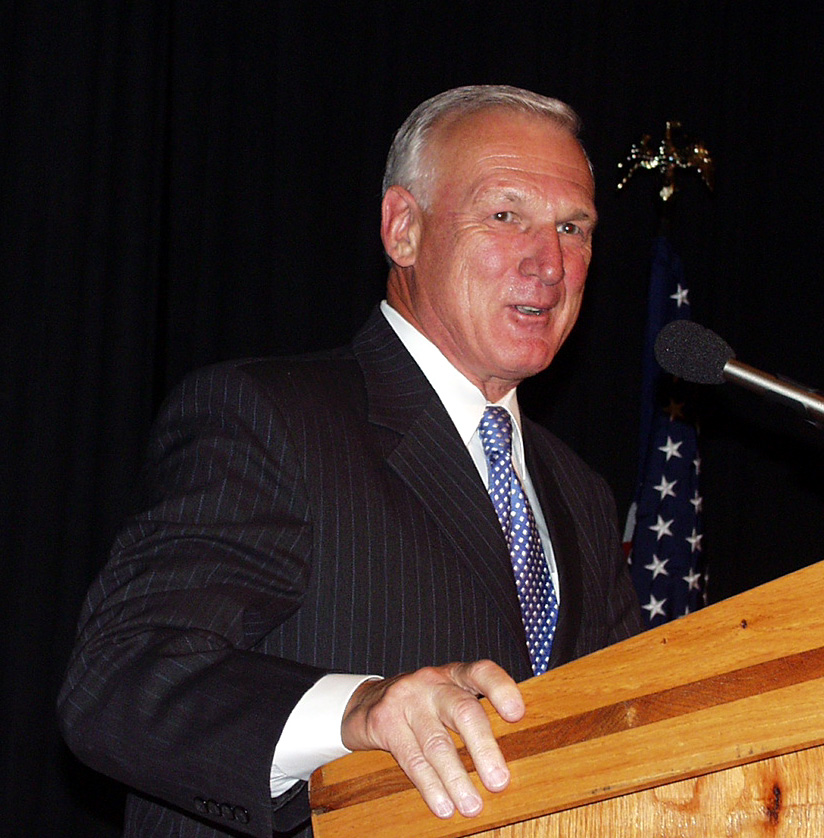 Later
in the program, San Diego County Supervisor Ron Roberts—there to present a
proclamation recognizing the United Jewish Federation on its 70th
anniversary—told a story of how a visit he made to Israel has affected some
public programs in San Diego County. Later
in the program, San Diego County Supervisor Ron Roberts—there to present a
proclamation recognizing the United Jewish Federation on its 70th
anniversary—told a story of how a visit he made to Israel has affected some
public programs in San Diego County.
"Last week we had the fifth graduating class of the San Pasqual
Academy. It is a special academy for foster care kids east of the Wild
Animal Park. We had 27 graduates and out of the 27 we had 12 youngsters who
are going onto four-year colleges and most of the rest are going on to
community colleges. In the foster-care world, this is unheard
of.
Several years ago, I had the fortune of being asked to visit Israel and at the
time we were struggling with the question, 'what should a model facility for
foster kids in San Diego look like?' And there was a woman by name of
Heidi Goldsmith who heads that organization in Washington D.C. that deals with
these kinds of issues and she had been helping me and others try to figure out
what would this look like if we had some of the resources...
"She had helped set up a trip for me to visit some of the schools in
Israel as part of the tour I took. The results of that helped us enormously to
shape in San Diego County what has become, I believe, the role model for
foster care facilities in this entire country.... It is affecting all of those
youngsters who are graduating today—some of them coming out of homes where
they had gone from home to home to home, some of them with more than 30
placements...We've got something good that is happening here... it is because
of people sharing ideas and specifically it had a lot to do with that visit to
Israel so many years ago."
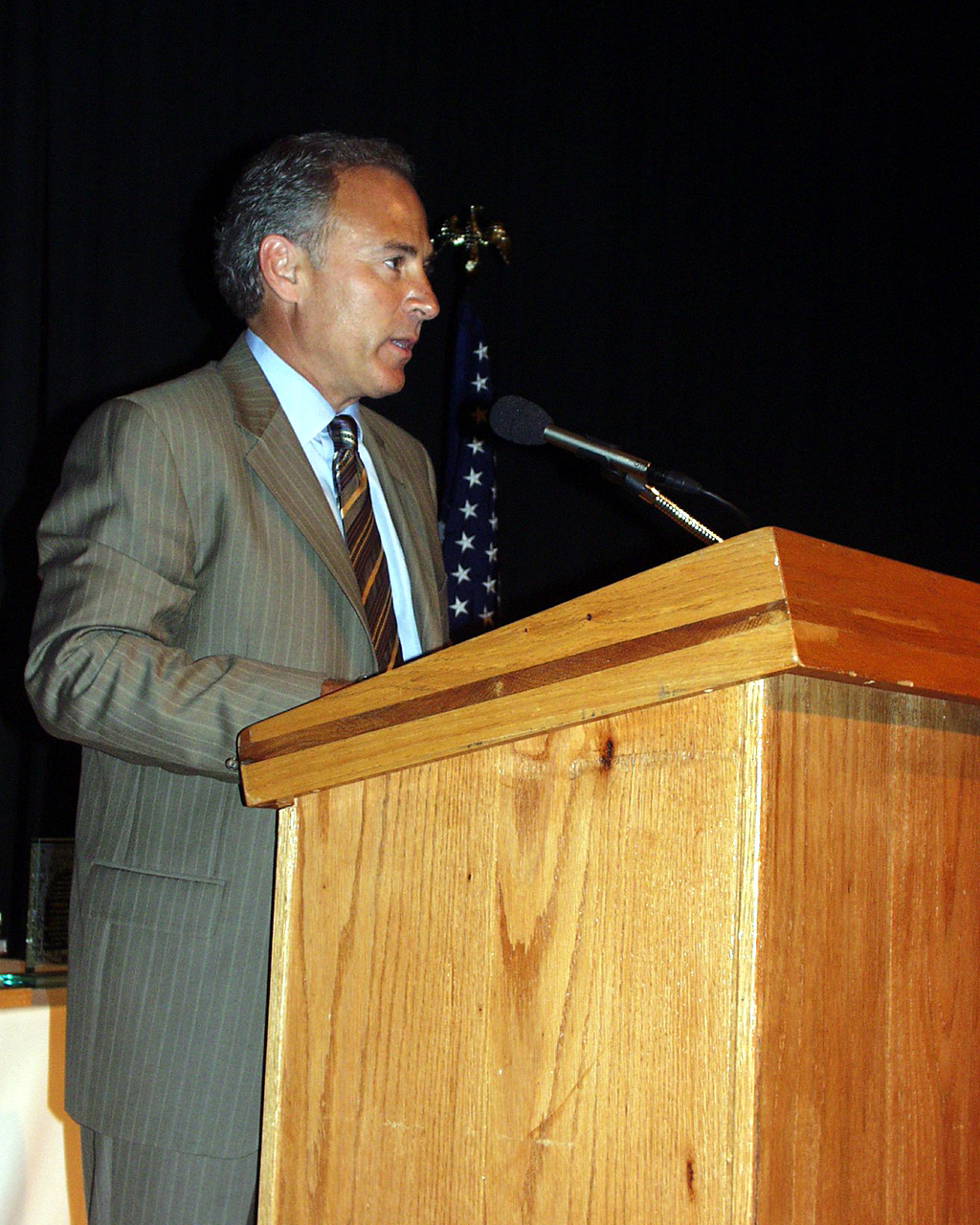 In
the business session of the meeting, the following UJF officers in addition to
Polin were elected by acclamation. Vice Presidents—Gary Kornfeld
(campaign chair); Andrea Oster (planning & allocations); Bev Pamensky
(women's division), Ken Bender, Danny Dabby, Tammy Moch and Jane Scher (at
large). Secretary—Andrea Oster. Treasurer—Marty Klitzner. In
the business session of the meeting, the following UJF officers in addition to
Polin were elected by acclamation. Vice Presidents—Gary Kornfeld
(campaign chair); Andrea Oster (planning & allocations); Bev Pamensky
(women's division), Ken Bender, Danny Dabby, Tammy Moch and Jane Scher (at
large). Secretary—Andrea Oster. Treasurer—Marty Klitzner.
The officers will sit as executive committee members along with the following
people: Lori Bolotin (Women's Division Campaign Chair); Jerry
Goldberg (Jewish Community Relations Council Chair); Sheila Potiker
(Jewish Community Foundation President); Steven Solomon and Gary Jacobs (two
immediate past presidents) and Orit Ostrowiak, Brian Tauber, Juli Bear, Claire
Ellman, Dr. David Geffen and Rob Fink (members at large).
Ken Polin, new president of UJF
|


 The
meeting at the Lawrence Family Jewish Community Center also saw Dr.
Steve Solomon succeeded as UJF president by Ken Polin, and seven San
Diegans given special recognition: Juli Bear, Brian Tauber and Kevin Wechter
as recipients of the Pauline & Stanley Foster Young Leadership Awards, and
Claire Ellman, Gary
Jacobs, Tammy Moch and Herb
Solomon as recipients of Steve Solomon's presidential awards.
The
meeting at the Lawrence Family Jewish Community Center also saw Dr.
Steve Solomon succeeded as UJF president by Ken Polin, and seven San
Diegans given special recognition: Juli Bear, Brian Tauber and Kevin Wechter
as recipients of the Pauline & Stanley Foster Young Leadership Awards, and
Claire Ellman, Gary
Jacobs, Tammy Moch and Herb
Solomon as recipients of Steve Solomon's presidential awards. Micha
Feldman, who organized Operation Solomon which brought thousands of Jews from
Ethiopia to Israel in 1991, told of traveling to a Jewish village in Gondar
province five years before then and being amazed when children addressed him
in Hebrew. The next day, Shabbat, he watched as the small community took
from a wooden box its only Torah—which had been sent by a congregation in
New York—-and remembered how surprised he was when the rabbi of the small
synagogue told him to read the Torah.
Micha
Feldman, who organized Operation Solomon which brought thousands of Jews from
Ethiopia to Israel in 1991, told of traveling to a Jewish village in Gondar
province five years before then and being amazed when children addressed him
in Hebrew. The next day, Shabbat, he watched as the small community took
from a wooden box its only Torah—which had been sent by a congregation in
New York—-and remembered how surprised he was when the rabbi of the small
synagogue told him to read the Torah.